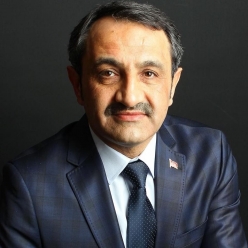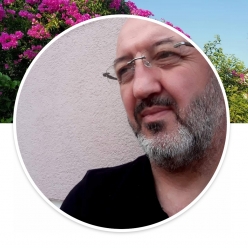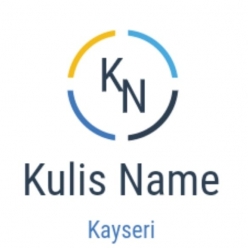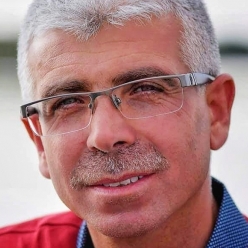- 03 Şubat 2026 - YÜRÜYÜN, DURMAYIN! DURURSANIZ SIRATTAN DÜŞERSİNİZ.
- 26 Ocak 2026 - ŞEHVET-İ KELAM VE KALEM İÇİN SUSTURUCU: KABAK
- 19 Ocak 2026 - KALİTE ANLAŞILMAK İÇİN ZAMAN VE SABRA İHTİYAÇ DUYAR
- 13 Ocak 2026 - HANGİ HAZİNE DAHA DEĞERLİ: YERALTI MI, YER ÜSTÜ MÜ?
- 05 Ocak 2026 - YOL ARKADAŞLIĞINDA HIZIR ÖLÇÜSÜ
- 30 Aralık 2025 - CANLI YAYINDA KONUŞUR GİBİ KONUŞABİLMEK
- 22 Aralık 2025 - MEŞRUİYETİN OLMAZSA OLMAZ 3LÜSÜ
- 15 Aralık 2025 - DİNLE NEYDEN/GÖNÜLDEN
- 08 Aralık 2025 - MEVLANA, HOCA EFENDİ VE DİĞERLERİ
- 24 Kasım 2025 - ACI MI, TATLI MI?
- 17 Kasım 2025 - KÖTÜ KOKU KİMDEN GELİYOR?
- 10 Kasım 2025 - EVDE OTURAN ERKEN ÖLÜR!
- 03 Kasım 2025 - ACIYA/MUSİBETE AĞLAMANIN ETKİSİ
- 27 Ekim 2025 - DİNİN GELECEĞİ
- 20 Ekim 2025 - KENDİ EKSENİ (EGOSU) ETRAFINDA DÖNMENİN USULÜ
- 16 Ekim 2025 - DOĞADAN ALLAHA
- 06 Ekim 2025 - HİÇBİR BAŞARININ BEDELİ ŞEREFİMİZ OLMAMALI!
- 30 Eylül 2025 - SAPANLAR VE SAPITANLARIN AĞIR VEBALİ (NAHL, 16/25)
- 23 Eylül 2025 - EN BÜYÜK ENGELİMİZ: YAZAMAMAK
- 15 Eylül 2025 - YETERLİ VE DENGELİ BİR EĞİTİMLE İKİ KANATLI ÇOCUKLAR!
- 09 Eylül 2025 - MUAYENEYİ REDDEDEN DOKTOR
- 01 Eylül 2025 - STRESTEN NASIL KURTULURUZ?
- 25 Ağustos 2025 - DEMOKRASİ KARANLIKTA ÖLÜR
- 18 Ağustos 2025 - YAŞLANMAKTAN VE YORGUNLUKTAN HIZLI ÇIKIŞ
- 11 Ağustos 2025 - ÖNCE İNCİR/TİN/TATLI; SONRA ZEYTİN/TUZLU (TİN/95/1)
- 04 Ağustos 2025 - ELLERİMİZLE YAPTIĞIMIZ ALTIN KAFESLERİMİZ
- 28 Temmuz 2025 - YÜKSEKÖĞRETİM NASIL YÜKSEK OLUR?
- 21 Temmuz 2025 - DÜNYAYA ÖNCE GELMEK/YAŞLILIK KAZANIM MIDIR?
- 14 Temmuz 2025 - DİVRİĞİYİ GÖRMEDEN ÖLMEYİN!
- 08 Temmuz 2025 - VERİLEN EMRİ YERİNE GETİRMEK
- 03 Temmuz 2025 - AHSEN-İ TAKVİMSİN SEN (S.A.V.)
- 02 Temmuz 2025 - POSTMODERN DÖNEMİN MÜSLÜMANLARA SUNDUĞU FIRSATLAR
- 23 Haziran 2025 - BABANIN GÖLGESİ İYİ BİR ŞEY Mİ?
- 18 Haziran 2025 - ANADOLU MAYASI SÜTÜ YOĞURDA DÖNÜŞTÜRMÜŞTÜR.
- 10 Haziran 2025 - YURT DIŞI KURBANIN BEDELİ NE KADAR OLMALIDIR?
- 02 Haziran 2025 - ERTELEME HASTALIĞI (PROCRASTİNATİON)
- 27 Mayıs 2025 - OĞUZ TÜRKÜ İKİ ATEŞ ALTINDA
- 19 Mayıs 2025 - TÜRKİYE AİLE VAKFI-TAV (ACİL)
- 12 Mayıs 2025 - KISIR DÖNGÜ
- 05 Mayıs 2025 - TOPRAK OLMAYI İSTEMEK!
- 28 Nisan 2025 - YA 3 TLİ (TESPİT-TENKİT-TEKLİF) KONUŞUN, YA DA EBEDİYEN SUSUN!
- 22 Nisan 2025 - ÖLÜMDEN KİM/NİÇİN KORKAR?
- 14 Nisan 2025 - HER KİTABIN ANLAŞILMA REHBERİ TEK BİR KİTAPTIR.
- 10 Nisan 2025 - ZAMAN VE MEKÂNA BAKIŞIMIZ
- 07 Nisan 2025 - KİME KONUŞUYORUZ/YAZIYORUZ?
- 25 Mart 2025 - İYİ FİNAL/YAŞLILIK İÇİN
- 17 Mart 2025 - MİLLİ BİRLİK VE BERABERLİĞİMİZİN 5 KİLOMETRE TAŞI
- 10 Mart 2025 - NEYİ ÇEKİYORSUNUZ? (Rezonans-Çekim Yasası)
- 03 Mart 2025 - ŞEYTANI NE DAVET EDER?
- 24 Şubat 2025 - ŞANLI DEVRİMİ DUYDUNUZ MU?
- 17 Şubat 2025 - AİLE YILINDA KAMU-STK DENGESİ (AİLE VAKFI ÖNERİSİ)
- 10 Şubat 2025 - MİKROFONLA EZAN OKUNURKEN SAĞA/SOLA DÖNÜLÜR MÜ?
- 04 Şubat 2025 - YILDIZ MI, AY MI, KARA DELİK MİSİNİZ?
- 27 Ocak 2025 - FELAKETLERİN İLK ADIMI SUÇLUNUN MASA İLAN EDİLMESİYDİ
- 20 Ocak 2025 - ÜZÜMÜN SAPI, ARMUDUN ÇÖPÜ, MUZUN KABUĞU YENİR Mİ?
- 13 Ocak 2025 - BİZİ KİM DAHA İYİ YIKAR? SU MU, ATEŞ Mİ?
- 07 Ocak 2025 - KAN BAĞIŞI MI? HACAMAT MI?
- 30 Aralık 2024 - KAVGALARIN ASIL SEBEBİ NEDİR?
- 25 Aralık 2024 - VER KORKUYU DEĞİL; VER COŞKUYU
- 17 Aralık 2024 - İMAN-HİKMET-GAYRET-TEVEKKÜL
- 09 Aralık 2024 - ZITLIKLARIN ORTASINDA VASATI BULMAK
- 02 Aralık 2024 - MECELLE PUSULASI (ALTIN FORMÜL İÇERİR)
- 25 Kasım 2024 - ZAHMETTEN KAÇARAK RAHMETE ULAŞILABİLİR Mİ?
- 18 Kasım 2024 - HAK YOK VAZİFE VAR; FERT YOK CEMİYET VAR.
- 11 Kasım 2024 - POLİMAT-ENTELEKTÜEL
- 04 Kasım 2024 - ÖNCE DONANIM (HARDWARE) SONRA YAZILIM (SOFTWARE)
- 28 Ekim 2024 - İBRETLİK BİR ÖLÜMDEN DERS ÇIKARABİLMEK (FETÖ GERÇEĞİ)
- 21 Ekim 2024 - YAŞLANMA SÜREÇ ODAKLI BİR GELİŞMEDİR VE ANNE KARNINDAN BAŞLAR.
- 15 Ekim 2024 - ÜÇÜ BİRLEYEBİLİR MİYİZ? (Türkçülük/İslamcılık/Batıcılık)
- 07 Ekim 2024 - BEYİN-BEYİNCİK-VİCDAN=YASAMA-YÜRÜTME-YARGI
- 30 Eylül 2024 - GEÇMEK Mİ, KALMAK MI?
- 23 Eylül 2024 - METAFOR (MESNEVİ/KABAK METAFORU)
- 10 Eylül 2024 - İDDİALAR VE HIRSLARIMIZIN KUŞATTIĞI HAYATLARIMIZ
- 03 Eylül 2024 - KİTAP VE SİLAH DENGESİ
- 21 Ağustos 2024 - GÖZ BEBEĞİMİZ OLAN DOSTLARIMIZ (!)
- 12 Ağustos 2024 - ÖNCELİKLİ KAYGILARIMIZ
- 06 Ağustos 2024 - SEVGİ-ACI-HZ. İNSAN
- 29 Temmuz 2024 - İNİŞ-ÇIKIŞ-KONFOR
- 22 Temmuz 2024 - GENÇLİĞİN GÜNDEMİNDEKİ KONULARA DAİR: SORU/CEVAP
- 15 Temmuz 2024 - KAPAĞINIZ/DUDAĞINIZ KAPALI MI?
- 09 Temmuz 2024 - SÜLEYMANLAR AYAKTA ÖLÜR.
- 05 Temmuz 2024 - EVLİLİK YAŞI İÇİN 5 N 1 K (HZ. AİŞE ÖRNEĞİ ÜZERİNDEN)
- 25 Haziran 2024 - İNSAN HAYATA NEREDEN BAŞLAMALI ?
- 12 Haziran 2024 - İNSAN NEDEN ALZHEİMER VE DEMANS OLUR?
- 05 Haziran 2024 - SEVİNİNCE TOPRAĞA, ÜZÜLÜNCE GÖKYÜZÜNE BAK!
- 29 Mayıs 2024 - BİR HİKÂYENİZ VAR MI?
- 23 Mayıs 2024 - EN BÜYÜK SÜRPRİZ BİZİ BEKLİYOR OLABİLİR Mİ?
- 13 Mayıs 2024 - MESLEK LİSESİ Mİ, FEN/ANADOLU LİSESİ Mİ? (MÜFREDAT İÇİN)
- 06 Mayıs 2024 - ANAOKULU MU, ÜNİVERSİTE Mİ? (MÜFREDAT İÇİN)
- 29 Nisan 2024 - HARDAL TANESİ
- 22 Nisan 2024 - ÖZELEŞTİRİ Mİ / SAVUNMA MI?
- 08 Nisan 2024 - SİYASETTE ADALET Mİ FAYDA MI?
- 03 Nisan 2024 - YAPAMADIĞIMIZ ŞEYİ ALLAHTAN İSTEMEK!
- 26 Mart 2024 - BUEN VİVİR
- 25 Mart 2024 - BAŞROL DE Mİ OYNUYORSUNUZ, YOKSA FİGÜRAN MISINIZ?
- 13 Mart 2024 - NEHİR AKMALI!
- 12 Mart 2024 - NEHİR AKMALI!
- 05 Mart 2024 - SAYGI DUYMAM GEREKEN BU(!) MU?
- 29 Şubat 2024 - DÜNYA VE AHİRETTE UYUYABİLMEK VE UYANABİLMEK
- 22 Şubat 2024 - OMURGA
- 12 Şubat 2024 - AİLE NEDEN İLK DÜŞMANDIR?
- 09 Şubat 2024 - ANNE/BABA/ÖĞRETMEN ACI BİR TEBESSÜM
- 29 Ocak 2024 - DERDİNİN DEVASI SENSİN
- 23 Ocak 2024 - EŞYANIN RUHU
- 15 Ocak 2024 - ALÇAK GÖNÜLLÜ
- 09 Ocak 2024 - NEDEN UZAKLARI YAKIN, YAKINLARI UZAK ETTİK?
- 01 Ocak 2024 - EN BÜYÜK FESAT NEDİR ?
- 25 Aralık 2023 - İKİNDİ NAMAZI VE BENÎ KURAYZA YAHUDİLERİ
- 18 Aralık 2023 - Kütük Çok Sahibi Yok!
- 12 Aralık 2023 - Fix/Takıntı
- 27 Kasım 2023 - Haddini bil, mutlu ol!
- 20 Kasım 2023 - Korona Döneminin Dijital Çocukları
- 14 Kasım 2023 - Sessizliğin Gücü (Meryem, 19/10)
- 07 Kasım 2023 - Çocuğa Sevgi, Gence Güven ve Yaşlıya Saygı
- 16 Ekim 2023 - Pozitiflik, Saf Pozitiflik midir?
- 12 Ekim 2023 - Gülümseme ve Huzur
- 02 Ekim 2023 - Kabz ve Bast
- 20 Eylül 2023 - Bağınız her daim açık mı?
- 13 Eylül 2023 - Nişanlınız Nasıl Güzel Olur?
- 30 Ağustos 2023 - Helalleşme/Sıfırlama(!?) Mümkün mü?
- 22 Ağustos 2023 - Yalanın Negatif ve Pozitifi
- 17 Ağustos 2023 - Ne yığdırın, ne de bağırtın.
- 07 Ağustos 2023 - Kadife Yumruk (Gerçeğin Gücü)
- 03 Ağustos 2023 - Artırılmış Sanal Hayatın Kurbanları
- 23 Temmuz 2023 - Peygamber Kıssaları ve Çocuk Eğitimi
- 18 Temmuz 2023 - Peygamber Kıssaları ve Çocuk Eğitimi
- 03 Temmuz 2023 - Neredesin Hızır?
- 28 Haziran 2023 - Nakıs/Noksanlık/İmtihan
- 14 Haziran 2023 - 5 95den Büyüktür. (Çocuk Eğitimi)
- 06 Haziran 2023 - Aile Mahremiyeti ve Nükleer Enerji
- 29 Mayıs 2023 - Talip Olduklarımıza Dikkat!
- 23 Mayıs 2023 - Liderlere Hüsn-i Hâtime İçin 5 Tavsiye
- 15 Mayıs 2023 - Seferoğulları, Tellioğulları ve Yeşil Vadi
- 08 Mayıs 2023 - Ubasute
- 01 Mayıs 2023 - İşiniz Zor mu?
- 10 Nisan 2023 - Niyet-Düşünce-Söylem-Eylem-Amel-Ahlak
- 03 Nisan 2023 - Her Zaman, Her Şeye Rağmen Kazanmak mı?
- 27 Mart 2023 - Faraziye Hayatlar, Şimdi ve Burası
- 20 Mart 2023 - Kifayetsiz Muhterisler, Dış Güçler ve Türkiye Yüzyılı
- 13 Mart 2023 - Sofradaki Çatal (Vasat-Orta Yol)
- 06 Mart 2023 - Hayat; geriye doğru , ileriye doğru
- 20 Şubat 2023 - Sabır; Boyun Eğmek Değil Mücadele Etmektir.
- 13 Şubat 2023 - Deprem - Kenetlenme - Kader - Tedbir
- 08 Şubat 2023 - Köy/Şehir Gerilimi ve Başıboş Köpekler Sorunu
- 31 Ocak 2023 - Akupunktur-İğnelenme-Eleştiri
- 23 Ocak 2023 - Üç Farklı Rüzgârın Anaforundaki Ülkem
- 17 Ocak 2023 - Mehmetleri Fatih Yapmak İçin
- 09 Ocak 2023 - Mevlana, Konevi ve Urmeviyi Anlamak İçin
- 03 Ocak 2023 - Kadın ve Erkek Eş Değerdir.
- 26 Aralık 2022 - Sema bize ne anlatır?
- 20 Aralık 2022 - Kötülük Genini Çıkarabilir miyiz?
- 12 Aralık 2022 - Kimin Uydusuyuz?
- 05 Aralık 2022 - Sağlıklı Birey-Mutlu Aile-Huzurlu Toplum
- 02 Aralık 2022 - Hak ve Hakikat
- 21 Kasım 2022 - Acı Bir Tebessümle Kayan Yıldızlar
- 15 Kasım 2022 - Aile ve Gençlik Çalıştayı

DR. CEMİL PASLI
Siyaset ve Tefekkür
Siyaset ve Tefekkür
Siyaset, tefekkür dünyasının ürünleriyle yapılan bir terkip sanatıdır.
Tefekkür dünyası toplumun değişim ve dönüşümünde temel referanstır.
On üç yıllık Mekke’de teşkil olunan tefekkür dünyası temelleri üzerine Medine döneminde yönetim ve siyaset bina edilmiştir.
Siyaset ve yönetimin en temel meşruiyet kaynağı ise toplumsal sözleşmeye dayalı olmasıdır.
Bu sözleşme toplumu temsil eden vekiller üzerinden yürütülmeye çalışılsa da tefekkür dünyası milletin ve vekillerinin önüne güncel, orijinal dokuya uygun fikirler sunmak zorundadır.
Onlar durduğu ve tıkandığı anda siyaset ve yönetim de tıkanır ve bu tıkanmanın başta ekonomi olmak üzere toplumu ilgilendiren bütün bileşenlere olumsuz etkileri olur.
Erol Güngör bu konuda şu net cümleyi kurar:
“Eğer İslam dünyasının yeniden yücelmesi mümkün olacaksa bunun kaynağını siyasi gelişmelerde değil, tefekkür sahasında aramalıyız. Bu demektir ki İslam davasının asıl yükü fikir adamlarının omuzlarına yükleniyor. Müslüman aydınlar ve din adamları, âlimler, mütefekkirler, sanatkârlar bu sorumluluğun şuuruna ermek zorundadırlar. Medeniyetleri politikacılar yaratmaz; medeniyet âlimlerle sanatkârların işidir. Yeni bir İslam Medeniyeti de elbette ilim, fikir ve sanat eseri yaratanların omuzlarında yükselecektir. Eğer onların gayretleriyle Müslümanlar arasında bir silkinme ve kalkınma olursa, siyasi hedefler kendiliğinden gerçekleşir. Bu gayeye ulaşabilmek için İslam aydınlarının kendilerini yıpratan, enerjilerini büyük ölçüde boşa çıkaran siyasi çekişmelerden mümkün olduğu kadar uzak kalmaları, günlük hadiselere tepeden bakarak kalıcı, köklü çözümler üzerinde kafa yormaları gerekiyor. ” (Erol Güngör, İslam’ın Bugünkü Meseleleri, 208-209)
Tabiatıyla eğitimi düzeltmek için en zeki gençlerin sınıf öğretmenliğine yönlendirilmesi ilkesi gibi; İslam dünyasının yücelmesi için en zeki gençlerin tefekkür dünyasına kazandırılması gerekiyor.
Bugün toplumda olumlu/olumsuz bütün gelişmelerde ilk bakılacak yer önce aile sonra yüksek öğretim kurumlarıdır.
Fertte tefekküre müsait bir zihin dünyasının gelişmesi aileden başlayan ve devamında çocuğun muhatap olduğu kurumlarda devam eden adalet/düşünce özgürlüğü/şura endeksine bağlı olarak gelişir ya da gelişmez.
Yakın tarihimiz hepimize şu gerçeği gösterdi ki;
Büyük laflar, iddialı cümleler veya içi boş sloganlardan ziyade daha somut küçükte olsa sağlıklı adımlara ihtiyacımız var.
İnsanın varlığı (ontoloji) bilgiye (epistemoloji) dayanır.
İnsan bilgi sahibi olduğu kadar insan, bilgiden uzak kaldığı kadar da hayvan hatta daha aşağıdır.
Bilgi sahiplerini üç grupta ele alabiliriz:
1.Malumat sahipleri: Önüne gelen her bilgiyi rastgele hafızasına dolduranlar.
2.Bilgi Teknisyenleri: Bilgiyi daha seçici biçimde elde eden ve onları bir sistem dâhilinde tasnif edenler.
3.Düşünürler (Mütefekkirler): Sahip olduğu bilginin içerisindeki kod/kök hücre den orijinal/özgün/yeni bilgi üretenler.
Ebu Hanife (r.a.)’nin istihsan metodu ayet ve hadisteki özü bulup kendi çağının insanına yorumlamaya, daha açık bir ifadeyle ayet ve hadisteki manayı bir kumaş gibi değerlendirip her muhatabın vücut ölçülerine göre, ona özel elbise dikmeye dayanıyordu.
Zira o kumaştan ve insandan iyi anlıyordu.
Bir milletin yükselişi malumatfuruşları ve bilgi teknisyenlerinden ziyade düşünürleri/mütefekkirleri çoğaltmakla mümkün.
Bunun yolu da düşünür yetiştirecek özgür ortamı sağlamanın yanında düşünmenin getirisinin siyasetin getirisinden daha yüksek hale getirilmesinden geçiyor.
Nasreddin Hoca asırlar öncesinde bize bu gerçeği haykırmıştı.
Hindi mi Papağan mı?
O hindi demişti.
Biri car car konuşurken o düşünüyordu.
Politics and Contemplation
Politics is an art of composition made with the products of the world of contemplation.
The world of contemplation is the fundamental reference in the change and transformation of society.
Administration and politics were built during the Medina period on the foundations of the world of contemplation that was established in Mecca for thirteen years.
The most basic source of legitimacy of politics and administration is that they are based on social contract.
Even though this contract is tried to be carried out through representatives representing the society, the world of contemplation must present ideas that are up-to-date and in line with the original texture before the nation and its representatives.
As soon as they stop and become blocked, politics and administration also become blocked, and this blockage has negative effects on all components concerning society, especially the economy.
Erol Güngör makes the following clear sentence on this subject:
“If it is possible for the Islamic world to rise again, we must look for its source in the field of contemplation, not in political developments. This means that the real burden of the Islamic cause falls on the shoulders of intellectuals. Muslim intellectuals, clergy, scholars, thinkers and artists must become conscious of this responsibility. Politicians do not create civilizations; Civilization is the work of scholars and artists. A new Islamic Civilization will of course rise on the shoulders of those who create works of knowledge, ideas and art. If, thanks to their efforts, there is a revival and development among Muslims, political goals will be realized automatically. In order to achieve this goal, Islamic intellectuals need to stay as far away as possible from political conflicts that wear them out and waste their energy to a large extent, and they need to look down on daily events and think about permanent, radical solutions. ” (Erol Güngör, Today's Issues in Islam, 208-209)
Naturally, such as the principle of directing the smartest young people to classroom teaching in order to improve education; In order for the Islamic world to be exalted, the most intelligent young people must be brought into the world of contemplation.
Today, in all positive or negative developments in society, the first place to look is first the family and then higher education institutions.
The development of a mental world suitable for contemplation in an individual develops or does not develop depending on the justice/freedom of thought/consultation index, which starts in the family and continues in the institutions the child deals with.
Our recent history has shown us this truth:
Rather than big words, assertive sentences or empty slogans, we need more concrete and healthy steps, even if they are small.
Human existence (ontology) is based on knowledge (epistemology).
As long as a person has knowledge, he is a human; as long as he is away from knowledge, he is an animal, even lower.
We can discuss information holders in three groups:
1. Information holders: Those who randomly fill their memory with every piece of information they come across.
2. Information Technicians: Those who obtain information more selectively and classify it within a system.
3.Thinkers: Those who produce original/original/new information from the code/stem cells within the knowledge they have.
Abu Hanife's (r.a.) istihsan method was based on finding the essence of the verses and hadiths and interpreting them to the people of his age, or, more clearly, evaluating the meaning of the verses and hadiths as a fabric and sewing special clothes for each addressee, according to his body measurements.
Because he had a good understanding of fabric and people.
The rise of a nation is possible by increasing the number of thinkers/contemplatives rather than knowledgeable people and information technicians.
The way to achieve this is not only to provide a free environment to raise thinkers, but also to make the return of thinking higher than the return of politics.
Nasreddin Hodja shouted this truth to us centuries ago.
Turkey or Parrot?
He said turkey.
While someone else was talking, he was thinking.













Henüz Yorum yok